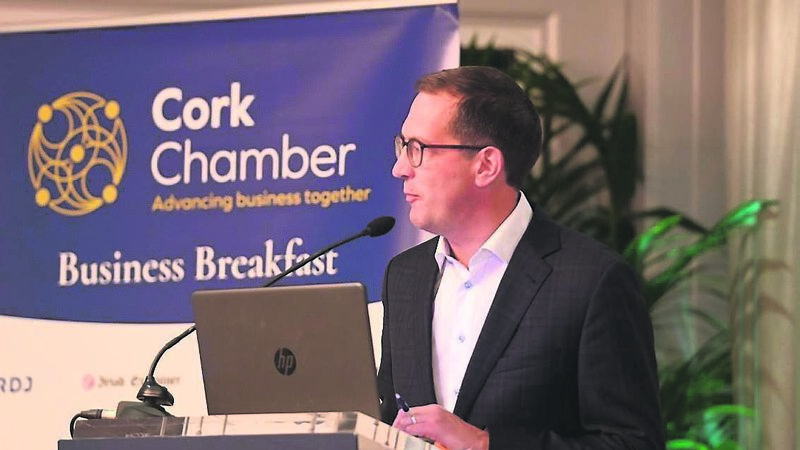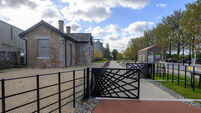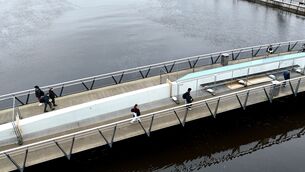Cork Chamber CEO: Cork showing ‘real signs of progress’

Cork Chamber CEO Conor Healy: ‘All the elements needed to cater for this type of growth have been high on the agenda for Cork Chamber, including housing, infrastructure, sustainability, education, policing, and public transport.’
CORK Chamber chief executive Conor Healy has welcomed the progress made on many projects in Cork over the past 12 months but said the delivery of housing and public transport projects are crucial to enhancing the appeal of the city region.
Mr Healy said many projects in Cork reached major milestones, including several infrastructural projects that came to fruition including the Dunkettle Interchange, the N22 Macroom bypass, and the Morrison’s Island Public Realm and Flood Defence Project, with works expected to commence next year.
He said there is also “great cause for optimism” with transformative projects such as the city’s docklands set to come on stream.
Mr Healy highlighted the progress being made on the BusConnects project, which is intended to transform the public transport network across the Cork Metropolitan Area.
He said that the completion of the BusConnects scheme, which recently went through a third round of public consultation, will “really enhance our public transport network”.
“BusConnects is poised to enhance Cork by promoting a more free-flowing city, fostering active travel, and reducing car dependence which will be an essential component of achieving climate neutrality,” said Mr Healy.
“As well as dedicated bus lanes, BusConnects will also see new cycling and walking infrastructure.
“Improving accessibility within the city and surrounds will increase the attractiveness of our city as a place to live and work and invest in.
“FDI [foreign direct investment] and talent attraction are dependent on an efficient high-functioning city. In order to achieve this, we have to aim to provide the same offering as other major European cities.
“Movement in and around the city is the cornerstone of fostering a dynamic and appealing urban environment, ultimately ensuring that our city remains competitive on the global stage.”
Mr Healy said, however, that despite the progress that has been made in the past year, there is “much more that must be achieved if we are to realise our climate-neutral ambitions while preparing the city for the growth it is set to experience under Project Ireland 2040”.
“Significant investment in rail services has been made as part of the Cork Area Commuter Rail Programme which will continue to improve service reliability, frequency, and capacity for Cork commuters.
“Plans for a light rail option for Cork must be accelerated if we are to achieve our climate goals and cater for our growing population, vast improvements in housing supply must be achieved and other areas of focus such as sustainability, education, policing, and public transport will remain high on Cork Chamber’s agenda.”
Mr Healy said that there is potential to accelerate the delivery timeline of Cork light rail which he said will prove crucial in meeting the city’s climate targets and enhance the overall liveability and economic vitality of the city.
“It would connect the city in a way never experienced in Cork before and would help to reduce traffic congestion and the ongoing dependency on private vehicles, while also supporting other planned improvements in public transport in Cork.
“From an urban development perspective, it will stimulate developments along its routes while the improved connectivity will boost economic growth.
“It is crucial that Cork is enabled to support, maintain, and grow the investment we have seen in the region in recent years.
“To do this we need to modernise the movement of people in our city, and at the very least provide the same offering as Dublin and other major European cities.
“We will continue to advocate at the highest levels for the shortening of the proposed timelines for this project this year.”
He also welcomed the successful year that Cork Airport has had, describing it as the principal international gateway to the region.
“Connectivity is a key economic enabler for our region. It is critical for attracting investment and talent to our region,” he said.
Speaking about FDI and indigenous businesses, he said that Cork is performing “exceptionally well”.
“2023 saw a stream of investments as well as expansion announcements from some of the biggest employers in the region.
“All the elements needed to cater for this type of growth have been high on the agenda for Cork Chamber and our 1,200 members, including housing, infrastructure, sustainability, education, policing, and public transport.
“We are indeed seeing real signs of progress in many of these areas with positive engagement from the highest level of Government.”
Over the course of the year, Cork Chamber met with Taoiseach Leo Varadkar, Tánaiste Micheál Martin, Enterprise Minister Simon Coveney, Transport Minister Eamon Ryan, and Justice Minister Helen McEntee to discuss top business priorities including sustainable infrastructure, competitiveness, energy security and supply, and sustainability, as well as policing, security, and safety across the city region.
Cork Chamber also met with Housing Minister Darragh O’Brien to discuss the delivery of homes, which Mr Healy said has remained a top priority for the business community.
“In line with Project Ireland 2040, Cork is projected to experience a 50% to 60% population increase,” he said.
“Currently, our population is expanding more rapidly than initially expected. Therefore, the Government’s ongoing emphasis on housing delivery is crucial to enhancing the appeal of our city region.”







 App?
App?


